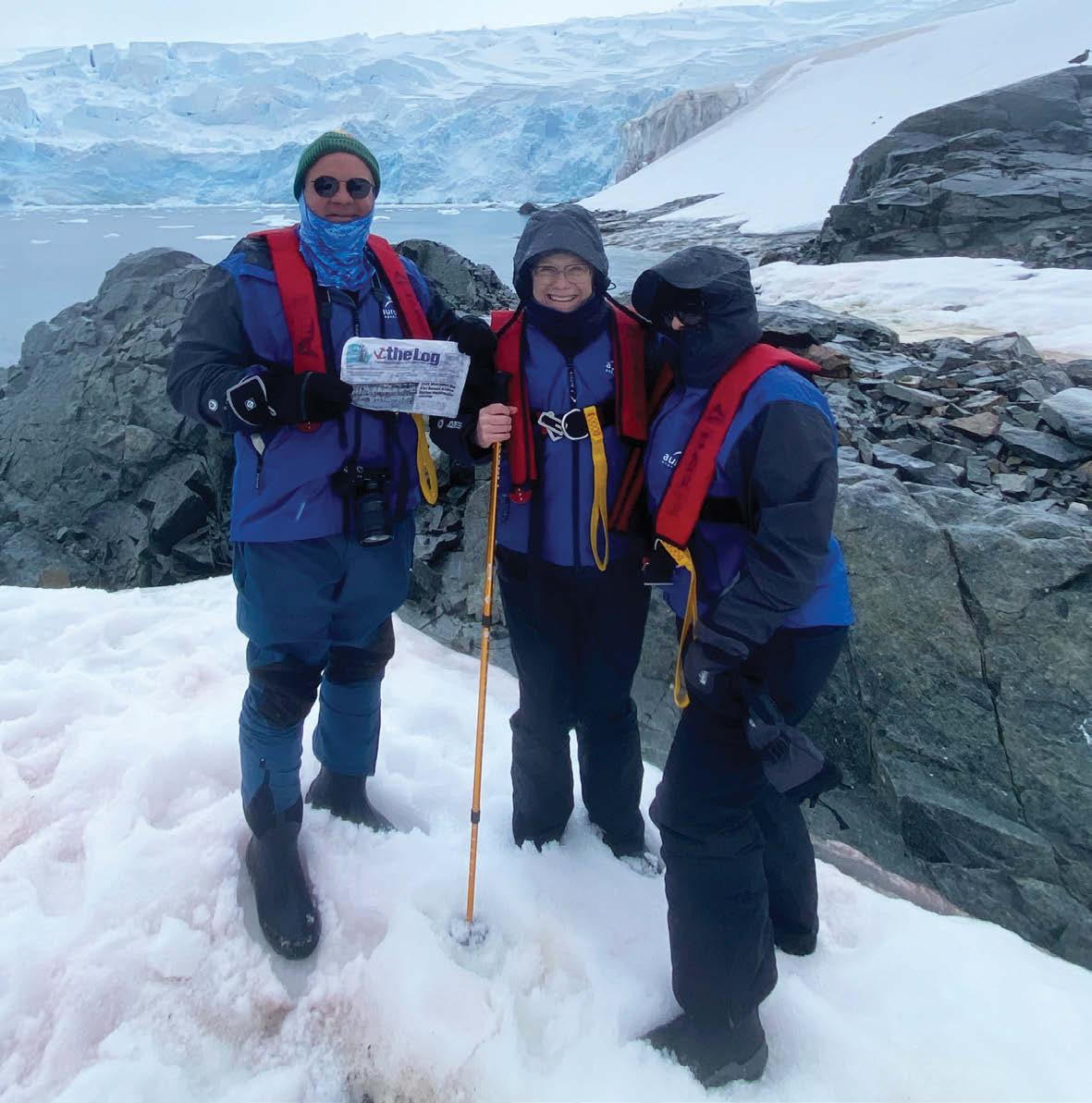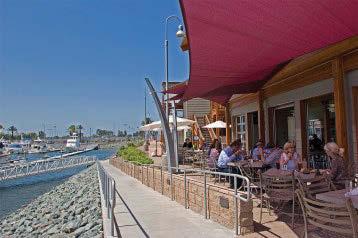
5 minute read
Log Abroad
ANSWER: First, I’ll tip my hat to our reader for taking the time to read his insurance policy. A marine insurance policy may take a while to read from cover to cover, but it’s important for boat owners to have a thorough understanding of what may be covered or excluded under their policy. With that in mind, let’s answer our reader’s question with an overview of some of the more obscure provisions of a marine insurance policy.
Marine insurance policies for recreational boats are usually “all risk” policies, meaning that the policy covers all losses unless the cause of the loss is specifically listed in the policy as being excluded from coverage. This differs from the “named risk” policies which are used for many commercial boats, and which cover only the risks specifically listed in the policy. The good news in the recreational boating world is that the policies are generally written in plain English without a lot of “legalese,” and the exclusions from coverage are usually clearly defined and listed separately in the policy documents.
Our reader’s question concerns one of those exclusions. He is concerned that the failure of a small component part may lead to a catastrophic loss of the boat, which would not be covered by insurance if the component part failed due to an excluded cause, such as corrosion. His interpretation of the policy is correct.
As noted above, recreational marine insurance policies are generally written in plain English and as such they are relatively easy to read. His policy defines the phrase “caused by,” and then lists a collection of
Please see ATTORNEY, PAGE 7
The Log’s taken you all over California ... Now it’s your turn to show us where you’ve taken The Log Email your photo, contact information and details about your trip to thelogeditor@thelog.com
Fax (949) 660-6172
EDITORIAL/CREATIVE (949) 660-6150
Editor and Publisher Duncan McIntosh, Jr. duncan@goboating.com

General Manager Kathleen Ford kathleen@goboating.com (949) 519-4745
Editor Katherine Clements katherine@goboating.com
Graphic Artist Meredith V. Ewell
Contributors
J.R. Johnson, Bob Vanian, Catherine French, David Weil, Capt. Pat Rains

ADVERTISING SALES (949) 660-6150 Fax: (949) 660-6172
Susanne Kirkham-Diaz (949) 503-7693 susanne@goboating.com
CLASSIFIED ADVERTISING (800) 887-1615
Jon Sorenson jon@goboating.com
SUBSCRIPTION SERVICES (800) 887-1615 jon@goboating.com
THE LOG ONLINE AND NEWSLETTERS thelog.com
Newsletters To subscribe to the Log's Newsletter, go to thelog.com
The Log, San Diego Log and FishRap are registered trademarks of Duncan McIntosh Co. Inc. Copyright 2023, all rights reserved. No potential events or actions for which a loss would not be covered by the insurance. If a boat sinks due to a corroded or wornout part, the entire claim would probably be denied.
Our reader may be thinking of a loss caused by “latent defect” coverage in the policy. A latent defect is an unknown defect that is not discoverable by a reasonable and prudent inspection. Most yacht insurance policies exclude latent defects, but - as suggested by our reader - they cover damage that results from a latent defect. The policy language will typically exclude the cost of replacing or repairing any item having a latent defect that causes damage to the yacht, but any damage resulting from the failure of that part would be covered. For example, if a boat ran aground due to a metallurgical failure in the structure of the rudder, the failure of the rudder may be found to be a latent defect. Under those circumstances, the replacement of the rudder would not be covered, but the damage to the rest of the boat from the grounding would be covered.
The real problem with a latent defect is in defining this term, as it is remarkably broad in scope. The defect must be undiscoverable under an inspection that a reasonable and prudent person or entity would undertake to evaluate the seaworthiness of the boat. And, a latent defect is usually defined to mean a hidden defect that existed from the time of manufacture.
Complicating things even further, most marine insurance policies expressly exclude coverage for “manufacturing defects.” And, unlike latent defect coverage, t he exclusion for manufacturing defects will not include the extended language used to cover the damage that may result from the defect.
A manufacturing defect is defined in
News Briefs
From page 5 of Commerce. The Final Rule required each charter boat to be “equipped with NMFS-approved hardware and software with a minimum capability of archiving GPS locations.” most policies as the improper, incorrect or inadequate manufacturing process of the insured yacht’s hull or machinery or any of its components. The exclusion of a manufacturing defect from the boat owner’s marine insurance policy makes sense, since the policy would otherwise be providing a warranty for the defective product, and as such, free insurance for the manufacturer.

The Rule would have required charter boats to install onboard an NMFSapproved Vessel Monitoring System (VMS) tracking device—an “anchor bracelet”—that continuously transmits the boat’s GPS location to NMFS, whether the ship is being used for a charter-fishing trip or something else. Charter boat operators “are responsible for purchasing the VMS units,” which the Final Rule estimated would cost upwards of $3000 plus a monthly service fee of $40 to $75. NCLA argued this 24-hour GPS surveillance was not only unnecessary and unduly burdensome but also that this requirement violated the Fourth Amendment by searching without probable cause or a warrant, exceeded the authority granted by the Magnuson-Stevens Act (MSA), and was arbitrary and capricious in violation of the Administrative Procedure Act (APA).
The problem for the boat owner is that, in many cases, a hidden defect can be viewed as both a manufacturing defect, in the sense that it was due to a mistake of the manufacturer, and a latent defect, in that it was hidden and it existed from the time of manufacture. Insurance adjusters may deny coverage if it is a close call or if the cause is actually unknown, but seems like a manufacturer’s defect. The courts that have reviewed such cases have reached a wide range of decisions.
As you may conclude from this discussion, marine insurance claim processing tends to be a lot more complicated than the processing of claims for other types of insurance. So it’s important for a boat owner to be fully informed in the event of a claim. Read your policy before getting underway and again after the accident. And hire an experienced maritime attorney if you need to go to battle over a significant claim denial.
David Weil is licensed to practice law in the state of California and as such, some of the information provided in this column may not be applicable in a jurisdiction outside of California. Please note also that no two legal situations are alike, and it is impossible to provide accurate legal advice without knowing all the facts of a particular situation. Therefore, the information provided in this column should not be regarded as individual legal advice, and readers should not act upon this information without seeking the opinion of an attorney in their home state.
NCLA also complained that the Rule required reporting economic data that the agencies had nowhere specified in proposing the Rule for comment.
The Fifth Circuit agreed with NCLA’s analysis and held that the GPS-tracking requirement was unlawful for “several independently sufficient reasons.” These include:
• That the “unambiguous language of the Magnuson-Stevens Act does not authorize the regulation.”
• “The Government failed to respond to public comments expressing concerns of personal privacy violations stemming from GPS surveillance.”
• “The Government failed to rationally consider the associated costs and benefits.”
• The Final Rule cannot withstand APA review because there was an improper notice of the data the agency planned to collect.
For the full press release, please visit https://bit.ly/3SupPs3.
Point Loma Marina


Jimmy’s Famous American Tavern
Open for Brunch Saturday & Sunday
Open
Pier 32 Waterfront Grill










